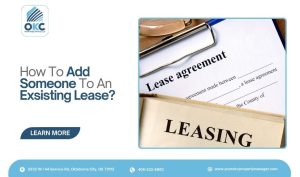Thinking about buying a rental property, or if you already own one, you’ve probably asked yourself:
How much does it actually cost to run a rental property?
That’s a smart question, because your profit doesn’t come from the rent you collect. Your profit comes from what’s left after all the expenses.
Over 20 years of managing rental properties in Oklahoma City and nearby metro areas. I’ve seen many new landlords underestimate these costs and end up frustrated, stressed, or even losing money. This guide breaks down everything you need to know about rental property expenses. Whether you own rentals in Oklahoma City, Edmond, Yukon, Moore, Midwest City, Norman, or anywhere else in the U.S., this will help you:
- Avoid surprise expenses
- Set rent the right way
- Protect your cash flow
- Budget accurately
- Reduce long-term costs
- Make smarter investment decisions
Let’s walk through the complete list.
What Are Rental Property Expenses?
Rental property expenses are all the costs you must pay to operate, maintain, repair, and manage your rental property.
These expenses include:
- Maintaining the home
- Paying taxes and insurance
- Fixing repairs
- Preparing the home for new tenants
- Paying utilities (if landlord-paid)
- Hiring a property management company
- Saving for big-ticket items like roofs and HVAC systems
These expenses directly impact:
- Cash flow
- Cap rate
- Net operating income
- Tax deduction
- Long-term return on investment
Even the IRS requires you to list these costs on Schedule E during tax season.
To make this easy, let’s break the expenses into three categories:
- Fixed expenses (stay mostly the same)
- Variable expenses (change with usage, age, and tenants)
- Capital expenses (big-ticket items that come every few years)
1. Fixed Rental Property Expenses
These expenses happen every month or year, no matter what. They are predictable and easy to budget for.
I. Property Taxes
Every landlord pays property taxes. The exact amount depends on:
- County tax rates
- School district
- Property value
- Local assessments
In Oklahoma County, property tax rates generally range from:
-> 0.80% – 1.00% of the home’s value
Example:
A $200,000 rental in Oklahoma City may cost:
- $1,600 – $2,000 per year in property taxes.
These taxes usually increase over time, especially in areas with rising home values.
II. Landlord Insurance (Rental Property Insurance)
Landlord insurance protects you against:
- Property damage
- Liability claims
- Tenant-caused losses
- Loss of rental income (if included in your policy)
In OKC, Norman, Edmond, and Moore, the typical cost is:
-> $900 – $1,800 per year
Factors affecting price:
- Crime risk
- Tornado exposure
- Home age
- Construction type
- Safety features (smoke detectors, security lights, etc.)
Never skip insurance; one major claim can wipe out years of profit.
III. Property Management Fees
If you choose a property management company like OKC Home Realty Services, expect fees such as:
- 8% – 12% of monthly rent
- Leasing fee (usually 50% – 100% of one month’s rent)
- Renewal fees
- Inspection fees
- Eviction coordination fees (only if needed)
Good property management often save more money that it costs through:
- Lower vacancy
- Faster leasing
- Better maintenance
- Professional tenant screening
- Proper bookkeeping
- Legal compliance
IV. HOA Fees
If your rental is inside an HOA, fees often cover:
- Landscaping
- Common area upkeep
- Pools and parks
- Community repairs
HOA fees typically cost:
-> $25 – $150 per month, depending on amenities.
V. Mortgage Payments
If you financed your property, your mortgage is a monthly fixed cost. Only the interest portion is tax-deductible, not the principal.
For many landlords, mortgage payments take up the largest portion of monthly expenses.
VI. Routine Pest Control
Many landlords pay for quarterly pest treatment to:
- Prevent roaches
- Stop termites
- Reduce mice or ants
- Keep the property sanitary
Budget:
-> $100 – $250/year
2. Variable Rental Property Expenses
These expenses are harder to predict because they depend on:
- Age of the property
- How tenants treat the home
- Weather
- Market conditions
- Number of turnovers
Let’s break them down.
I. Repairs and Maintenance (Yearly Operating Costs)
This is the expense category that surprises most landlords.
General rule of thumb:
-> 1% – 3% of the property’s value per year
For a $200,000 OKC rental:
- Minimum: $2,000/year
- Common range: $3,000-$6,000/year
Examples of typical repairs:
- HVAC servicing
- Leaky faucets
- Broken garbage disposal
- Electrical outlet issues
- Toilet repairs
- Microwave replacement
- Fence repairs
- Door lock replacements
Repairs cost more when:
- The home is older
- Tenants are rough on the home
- The landlord delays small fixes
II. Turnover & Make-Ready Costs
Every time a tenant moves out, the property needs a “fresh start”. This includes:
- Deep cleaning
- Carpet cleaning
- Repainting walls
- Repairing small damage
- Yard cleanup
- Lock changes
- Replacing blinds
- Patch holes
Typical OKC make-ready costs:
-> $500 – $2,500 depending on wear and tear.
Turnover is the most expensive event for landlords because you also lose rent during vacancy.
III. Vacancy Costs
Vacancy = no rent coming in.
In Oklahoma City, the average vacancy rate it:
-> 5% – 7%, depending on the neighborhood.
This means you should budget:
-> One month of lost rent per year
If your rent is $1,400, that’s a $1,400 yearly cost you must plan for.
IV. Utilities (When Landlord-Paid)
Most single-family landlords make tenants pay:
- Water
- Gas
- Electricity
But sometimes the landlord pays utilities if:
- It’s a duplex or triplex
- Units share meters
- You offer “utilities included” as a marketing perk
Average costs (if landlord-paid):
- Water: $40-$90/month
- Electricity: $100-$180/month
- Gas: $40-$120/month
V. Seasonal Maintenance Costs
Your rental may need periodic services such as:
- Lawn mowing
- Leaf cleanup
- Tree trimming
- Gutter cleaning
- HVAC tune-ups
- Sprinkler repairs
Cost ranges:
- Lawn mowing: $30 – $60 per visit
- Tree trimming: $200 – $800
- Gutter cleaning: $100 – $200
- Annual HVAC tune-up: $90 – $150
3. Capital Expenditures (CapEx)
Capital expenditures are big-ticket repairs that last many years. They are not yearly repairs, they are long-term investments.
Examples of CapEx:
- Roof Replacement – $6,000 – $12,000
- HVAC Replacement – $4,000 – $8,000
- Water Heater – $900 – $1,800
- New Windows – $6,000 – $15,000
- Major Plumbing – $2,000 – $10,000
- Driveway/Concrete work – $1,500 – $4,000
You should save for CapEx every year so these expenses don’t hit your cash flow at once.
Recommended CapEx savings:
-> 5% – 15% of monthly rental income
For a $1,500 rental, that’s:
- $75 – $225/month
How Many Should You Budget for Rental Property Expenses?
Here are three simple methods investors use.
Method 1: The 50% Rule
This rule says:
-> Half of your rental income will go to expenses.
Example:
- Rent = $1,500/month
- 50% rule = $750/month toward expenses
While not perfect, it helps you quickly estimate costs and avoid overestimating profit.
Method 2: 1% – 3% Annual Maintenance Rule
You should save:
-> 1% – 3% of the home’s value per year for routine maintenance.
Example:
- $200,000 rental
- 1% = $2,000
- 3% = $6,000
Older homes or cheaper homes often fall closer to the 3% – 5% range.
Method 3: Line-Item Budgeting (Most Accurate)
Let’s use a real-world Oklahoma City example.
Sample OKC Rental Numbers:
Rent: $1,500/month
Annual Rent: $18,000
Typical Annual Expenses:
| Expense | Cost |
| Property Taxes | $1,800 |
| Insurance | $1,200 |
| Repairs/Maintenance | $3,000 |
| CapEx Savings | $2,000 |
| Property Management | $1,800 |
| Vacancy (1 month) | $1,500 |
| Make-ready | $1,000 |
| Pest/Landscaping | $600 |
| Misc. | $400 |
- Total Annual Expenses: $13,300
- Net Cash Flow: $18,000 — $13,300 = $4,700/year
- Monthly Cash Flow: $391/month
This is a realistic cash flow for many Oklahoma City homes.
Tax-Deductible Rental Property Expenses (What You Can Write Off)
The IRS allows landlords to deduct many rental expenses to reduce taxable income.
Fully Tax-Deductible Items:
- Insurance premiums
- Repairs and maintenance
- Property management fees
- Mortgage interest
- Utilities you pay
- Supplies (tools, paint, cleaning products)
- Advertising
- Professional fees (legal, accounting)
- Pest control
- Travel to/from the property
- Home office (if you qualify)
Depreciation (A Major Tax Benefit)
The IRS lets you depreciate the home over 27.5 years.
Example:
If the building value is $180,000 (land excluded):
Depreciation = $180,000/27.5 = $6,545 per year
This significantly lowers your taxes, even though it’s not a cash expense.
Non-Deductible Items
- Principle portion of your mortgage
- Tenant damages not repaired yet
- Your own labor
- Improvements (must be depreciated, not deducted)
Common Mistakes Landlords Make with Expenses
Many rental property headaches and profit losses can be traced back to a few avoidable mistakes. Here are the biggest ones to watch out for:
1. Not Saving for Major Repairs
Every property needs big-ticket repairs eventually: roofs, HVAC systems, water heaters, and appliances. If you don’t set aside reserves, these costs hit hard and disrupt cash flow.
2. Forgetting that Vacancy is an Expense
An empty property costs money.
- You still pay:
- Mortgage
- Utilities
- Insurance
- Repairs
Plan for vacancy so it doesn’t become a financial surprise.
3. Underestimating Turnover Costs
Turnover is often more expensive than landlords expect.
It can include:
- Cleaning
- Painting
- Repairs
- Marketing
- Screening costs
- Lost rent
Minimizing turnover saves thousands over time.
4. Ignoring preventive maintenance
Skipping small fixes today leads to expensive repairs tomorrow. Regular tune-ups, inspections, and cleaning keep systems running longer.
5. Doing DIY Work that Makes Things Worse
Trying to save money by doing repairs yourself can backfire, especially with plumbing, electrical, or structural issues.
Bad DIY work usually results in:
- Code violations
- Bigger repair bills
- Safety risks
Stick to professionals for anything complex.
6. Skipping Tenant Screening
Choosing the wrong tenant leads to late payments, property damage, and eviction costs.
Screen every applicant with:
- Background checks
- Credit checks
- Income verification
- Rental history review
7. Setting Rent Too Low and Hurting Cash Flow
Rent that doesn’t match the market leaves money on the table. A small adjustment, $50 to $150, can make a big difference annually.
8. Failing to Track Expenses for Tax Time
Poor recordkeeping means missed deductions. This increases your tax bill and reduces profit.
Fixing these habits will make your rental property more stable, predictable, and profitable over the long run.
How to Keep Rental Property Expenses Low (Without Cutting Corners)
Keeping your rental profitable isn’t just about raising rent; it’s about managing your expenses wisely. The goal is to reduce costs without sacrificing quality or upsetting tenants. Here are smart, practical ways to do that:
1. Stay on Top of Preventive Maintenance
Small tune-ups can save you from big repair bills.
Example: A $99 HVAC tune-up can prevent a $900+ breakdown during peak summer or winter.
Regular maintenance also keeps tenants happy and reduces emergency calls.
2. Screen tenants carefully
The right tenant is your best money-saver.
Good tenants:
- Pay on time
- Take care of the property
- Stay longer
- Create fewer maintenance issues
Thorough screening cuts turnover costs and protects your investment.
3. Build Strong Relationships with Vendors
When vendors know you and expect ongoing work, they:
- Offer better pricing
- Prioritize your repairs
- Respond faster
Consistency can save you thousands over the long term.
4. Choose Durable, Long-Lasting Materials
Avoid cheap materials that wear out quickly.
Examples:
- Vinyl plank flooring lasts years longer than carpet.
- LED lighting lowers utility costs and replacement frequency.
- High-quality paint reduces how often you need to repaint.
5. Hire a Professional Property Manager
A skilled manager doesn’t add cost; they usually reduce it.
Companies like OKC Home Realty Services help you save money by:
- Catching repairs early before they become expensive
- Minimizing vacancy with proper marketing and pricing
- Conducting routine inspections
- Handling make-ready work efficiently
- Enforcing lease terms to prevent property damage
A good property manager keeps your investment protected and your expenses predictable.
Understanding Expenses Protects Your Cash Flow
Running a rental property is a business. And like any business, you must understand your expenses to stay profitable. When you know what costs to expect, and you budget for them, you can:
- Avoid financial surprises
- Make smarter investment choices
- Raise rent confidently
- Protect your property long-term
- Improve your cash flow
If you want help managing your rental property, reducing expenses, or handling tenants the right way, OKC Home Realty Services can take care of everything for you, from leasing to repairs to accounting.
Frequently Asked Questions
How much should I save each month for repairs?
Save 1% - 3% of home’s value per year.
How much should I save for CapEx?
Save 5% - 15% of rental income.
What expenses can I deduct?
Repairs, maintenance, management fees, utilities (landlord-paid), mortgage interest, depreciation, and more.
Is depreciation an expense?
Yes, for taxes. But it’s not a cash expense.
What expenses are allowed in rental income?
The IRS allows landlords to deduct most of the costs you pay to operate, maintain, and manage your rental property. These deductions reduce your taxable rental income, which means you keep more money in your pocket.
What expenses are not allowed for rental income?
-
Your own labor (you can’t pay yourself for repairs)
-
Principal mortgage payments
-
Improvements you add to the property (these must be depreciated)
-
Tenant-caused damage that isn’t repaired yet

Author
Scott Nachatilo is an investor, property manager and owner of OKC Home Realty Services – one of the best property management companies in Oklahoma City. His mission is to help landlords and real estate investors to manage their property in Oklahoma.
 (
(









